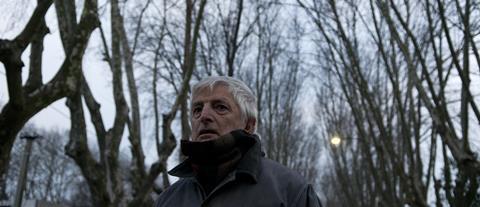Dir: Rodrigo Pla. Mexico-Uruguay-France. 2012. 84mins

This bleak, uncompromising piece of filmmaking finds Rodrigo Pla in a very different mood from his earlier films La Zona and El Desierto Adentro. A powerful, realistic drama about an impaired old man and the daughter who cares for him, this is not only a closely observed psychological portrait of the relations between them but more than that, a moving social study of penury at work destroying the fabric of a family.
There is a real sense of tragedy in this relationship.
No concessions are made here to gain anyone’s sympathy, one possible exception being a final moment of attempted grace and even that is only partial relief. The entire plot of The Delay (La Demora), based on a short story by Laura Santullo who also wrote the script, focuses on the confrontation between two characters - Agustin Suarez (Carlos Vallarino), who lives with his daughter Maria (Roxana Blanco), a single mother.
Whether it is his age - an early touch of Alzheimer or senility - Agustin is confused and forgetful, arthritic and unable to take care of himself and gets easily lost once he is on his own. He often lives in the past more than he does in the present and yet has some flashes of lucidity every once in a while.
Maria is a seamstress working at home for a pittance, harassed by the needs of her her three children - a teenage girl and two younger boys -and her father’s handicaps, has no one to turn to, including a sister who claims she cannot share the responsibility for their ailing parent. At the end of her tether, Maria tries to put her father in a shelter for old people, but she is told there are much worse cases than hers, at which point she commits an act out of desperation that she is bound to regret.
If this sounds like Latin melodrama, forget about it. Neither the script nor the direction, are interested in wallowing in unnecessary sentimentalism. Grimly sticking to the drab facts of Agustin and Maria’s life, it never tries to paint them either better or worse than they really are. They simply ring true.
Maria Secco’s cinematography offers a colour-drained, grey image which fits the mood of the film, whether it is in the extreme close-ups of the opening sequence, showing Agustin helplessly sitting in the bath with his daughter washing his back, or in the sadly dilapidated sights of the urban slums around them.
There is a real sense of tragedy in this relationship, the dignity and respect it displays towards the helpless old man who is fully conscious of his state but can’t help it and the growing despondency and pressure building up inside Maria whose conduct, under other circumstances could be easily considered not only heartless and even criminal.
The defeated, terrified look which never leaves Carlos Vallarino’s eyes reflects the insecurity of each and every one of his acts, and is matched by Blanco’s restrained performance, her haunted face, the tension building inside her as she is trying to cope with circumstances beyond her control until she keels under them. Pla’s empathy for both is evident and palpable. And to his credit, they look like real people grappling with real life. It may not be pretty to see but who said life always is?
Production companie:s Lulu Producciones, Malbicho Cine
Producers: Christian Valdellievre, Sandino Saravia Vinay, Rodrigo Pla
International Sales: Artscope/Memento Films International, www.memento-films.com
Screenplay: Laura Santullo
Cinematography: Maria Secco
Editor: Miguel Shverdfinger
Production designer: Mariana Pereira
Music: Jacobo Lieberman, Leonardo Heiblum
Main cas: Roxana Blanco, Carlos Vallarino







![The Brightest SunScreen[Courtesy HKIFF]](https://d1nslcd7m2225b.cloudfront.net/Pictures/274x183/3/5/0/1448350_thebrightestsunscreencourtesyhkiff_312678.jpg)













